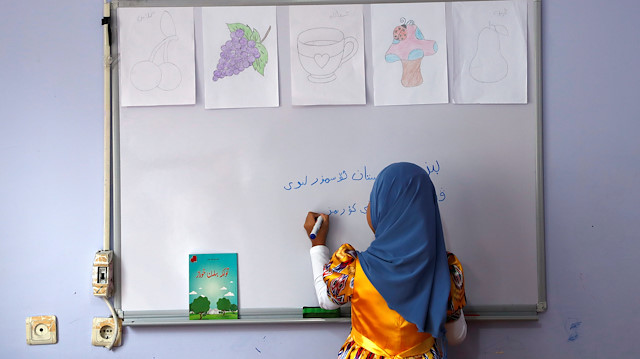
To cultivate loyal and submissive followers, Beijing separates thousands of children from their families
In Xinjiang state-run boarding schools, hundreds of thousands of children longing for their parents fill up classrooms as China's intensive political indoctrination efforts rage on.
A recent article penned by Amy Qin from The New York Times sheds light on the struggles of nearly "half a million Uighur children" who have been seperated from their parents, expressing concerns of families waiting frantically to be reunited with their kids.
It includes interviews with Uighur parents living in exile, documents published online, government notices, state media reports and the blogs of teachers assigned at these schools.
Abdurahman Tohti, a 30-year-old Uighur living in Turkey, hasn't heard from his wife and kids since they vanished after a visit to Xinjiang in 2016. At the beginning of 2019, he spotted his 4-year-old son in a video on Chinese social media. The boy seemed to be at a state-run boarding school and was speaking Chinese.
As education has turned into a tool for indoctrination in the Chinese Communist Party ideology, Tohti is afraid of his child hating him and his ethnic background.
“What I fear the most,” he said, “is that the Chinese government is teaching him to hate his parents and Uighur culture.”
Chinese authorities have recruited tens of thousands of politically-reliable teachers from across the country to implement the assimilation campaign from an early age in Xinjiang. Nearly 90,000 of them started to work at boarding schools in 2018 alone, officials said at a news conference this year.
Chen Quanguo, the party’s top official in Xinjiang, urged teachers to ensure children learn to “love the party, love the motherland and love the people” during his visit to a kindergarten in December.
The teachers are not only monitored by the state but society as well. A sign outside a kindergarten in Hotan invited parents to report teachers who made “irresponsible remarks” or participated in unauthorized religious worship.
“Sometimes, when they hear the voice on the other end of the call, the children will start crying and they hide in the corner because they don’t want me to see,” Kang Jide, a Chinese language teacher at the school wrote on his public blog on the Chinese social media platform WeChat.
He said that the most heartbreaking thing he has seen at the school is a girl slumping over the table to cry because she misses her family.
Children in the boarding schools are only allowed family visits once every week or two, and some never received visits from relatives, according to reports.
“It’s not just the children...the parents on the other end also miss their children of course, so much so that it breaks their hearts and they’re trembling,” he added.
Students are often forced to enroll because the authorities have detained their parents and other relatives, ordered them to take jobs far from home or judged them as unfit guardians.
Experts say that the long-term strategy of Chinese government is to conquer, to captivate, and to win over the young generation at an early age.
Uyghurs, a Turkic ethnic group that make up 45 percent of the population of Xinjiang, accuse China of carrying out repressive policies that restrain their religious, commercial and cultural activities.
As many as 1 million people, or about 7 percent of Xinjiang’s Muslim population, have been incarcerated in a sprawling network of "political re-education" camps, according to U.S. and UN studies. Beijing says that its camps in Xinjiang are "vocational training centers.”
Last September, the New York-based Human Rights Watch released a report accusing Beijing of a "systematic campaign of human rights violations" against Uighur Muslims in Xinjiang.
China has repeatedly denied any mistreatment of Uighurs.
Hello, the comments you share on our site are a valuable resource for other users. Please respect other users and different opinions. Do not use rude, offensive, derogatory, or discriminatory language.
The floor is all yours.










